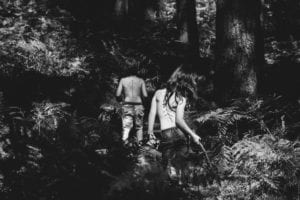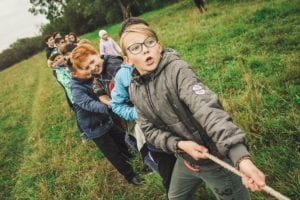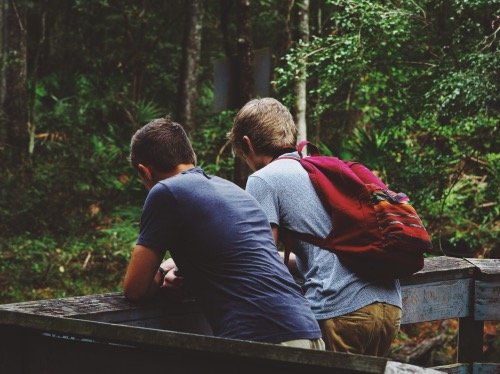Outdoor Classroom Day is upon us again and this year, more than ever, the call for outdoor education is strong. We’ve waxed lyrical for years about our belief that outdoor education should not be an extra curricular activity or an optional extra, rather that it should be a mandatory and essential part of every young person’s education. So this year, I thought we’d revisit our inaugural TOG Talk ‘Outdoors Learning; The Time is Now’ to find out from our director Shevek Pring, why we should be taking our classrooms outside.
 History of Outdoor Learning
History of Outdoor Learning
For thousands of years, outdoor learning was everything in education. All learning was outdoors and that was imperative for us as a species as it helped us build communities, learn to hunt, forage, make tools and to survive in the environment we existed in at that time. However, as we’ve started to move towards a more complex society, education has changed to fit that. From the 15th century, education was shaped by the Jesuit Priests who valued the abstract above the practical and it was this that allowed modern culture to develop. There’s no denying how this has helped shaped our modern society. We live in a global world and digital media is essential in how we now live. But by bringing education within four walls, it has narrowed what we consider education should be and limits the potential of young people to have the freedom to learn in a manner best suited to their individual strengths and interests.
What have we lost?
This also means we’ve lost the view of who we are as people in the wider context of the natural world. The connections we used to have with nature and the accompanying holistic approach have become a footnote in our educational approach. Whilst some would argue that the current educational model fits our society just fine, we would like to use some statistics to illustrate that this is not the case.
- 75% of school age learners receive less than the prescribed legal minimum of outdoor time for prisoners in the UK (1)
- Recent government surveys show that 90% of learners have no access to outdoor learning (2)
- 20% of year six students (aged 10-11) are considered obese (3)
- 20% of under 16’s have nightmares about climate change (4)
- 40% of under 16s don’t trust the adults in our society to solve the problem of climate change (4)
 How Would Outdoor Learning Help?
How Would Outdoor Learning Help?
- It’s experiential. This means that it takes the idea of learning away from those who are good at recall and memory, from those who can read and write effectively. It allows learners to connect dots in different ways to express themselves and actually understand the subjects they’re being taught.
- The holistic nature of outdoor learning provides an opportunity to learn social and emotional skills to connect with your peers in a way you wouldn’t in the classroom. Learners can learn how to fall out, how to argue, how to negotiate and provides a context for how to access those social areas of education that we aren’t providing currently.
- It’s empowering. It provides a new approach to failure (not giving up at the first hurdle but coming at the problem from another angle) as it removes exams and traditional metrics of testing. 47% of parents in the UK said they are scared to allow their children to access the outdoors in their communities in the same way they themselves did as children (5) (riding bikes, playing football in the street..etc). Outdoor learning allows learners to access the outdoors in a way they can’t otherwise.
Why Now? What’s The Urgency?
Our job as educators is not simply to impart knowledge but to empower children and young people so they are prepared for the future. This is important as the future they are going to be living in involves massive concerns and anxieties around climate change. There’s a lot of important work to be done that’s both economic and holistic in order to not only save our world but nurture it to create something new, something sustainable, something fairer to all that inhabit it. Here at The Outdoors Group, we believe that it’s really important for young people to be involved in the debate so they are engaged with what’s going on in their lives and what they’re going to be experiencing in the future. Currently, 60% of under 16’s don’t have any trust in our leaders to tackle climate change (4). Clearly, we need to gain back their trust and we think a revamping of our educational model is the way forward.  There is no Planet B. We need to empower change for the sake of our children and all the generations that are going to come. There’s a really powerful proverb from the First Nation’s People in America that says
There is no Planet B. We need to empower change for the sake of our children and all the generations that are going to come. There’s a really powerful proverb from the First Nation’s People in America that says
We do not inherit the Earth from our ancestors. We borrow it from our children.
At this juncture, we need to equip our young people to face an uncertain and unknown future and for us, outdoor learning and outdoor classrooms are the most powerful tool we have to affect that change. Author: Talk by Shevek Pring, Director, transcribed and edited by Hannah Durdin, Forest School Leader & Content Officer Date: Thursday 20th May 2021

 History of Outdoor Learning
History of Outdoor Learning How Would Outdoor Learning Help?
How Would Outdoor Learning Help? There is no Planet B. We need to empower change for the sake of our children and all the generations that are going to come. There’s a really powerful proverb from the First Nation’s People in America that says
There is no Planet B. We need to empower change for the sake of our children and all the generations that are going to come. There’s a really powerful proverb from the First Nation’s People in America that says






